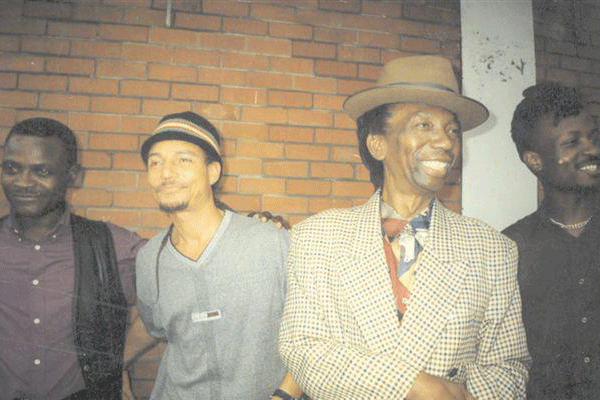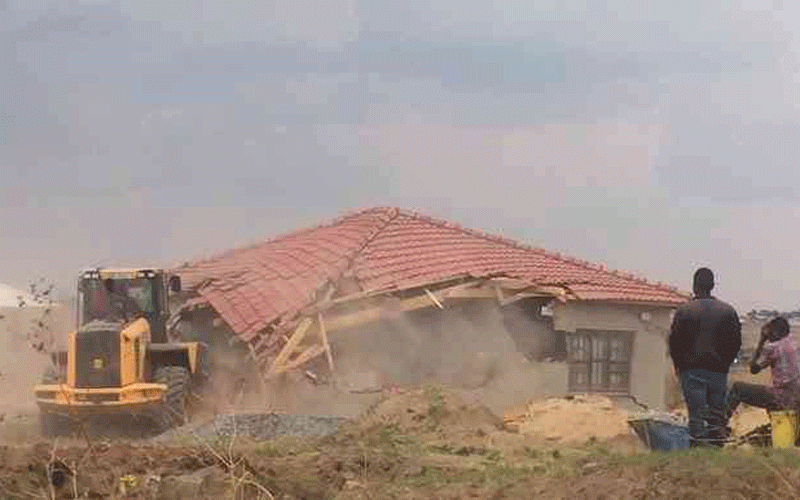
I was not aware of the big imprint which had been left by the Frontline Kids Band in Manicaland in the 1990s until I visited Mutare last weekend. Almost everyone who recognised me was asking, “What happened to the Frontline Kids Band?” I was surprised to know that people still remembered them.
in the groove with Fred Zindi

I struggled to find an answer to give them, except to tell them of the individual works presently being done by Noel Zembe, Emmanuel Thomas, Jevas Dzotizei and Filbert Marova. Most of the people who were asking me these questions were over 35 years of age.
This led me to start thinking about the groups and artists who were contemporaries of the Frontline Kids during the 1990s.
I compiled a list of 20 top musicians of the 1990s. This week, I will give you the first 10, with brief descriptions of who they were. The next 10 will follow next week.
Thomas Mapfumo
Thomas Mapfumo, also known as Mukanya or Hurricane Hugo, was born in Marondera in 1945. He was brought up by his grandparents, the Munhumumwes up to the age of 10 years. He is currently exiled in Oregon in the United States.
His most popular hits were: Pfumvu Paruzeva, Hokoyo, Gwindingwi Rine Shumba, Pamuromo Chete, Nyoka Musango, Butsu Mutandarika, Corruption, Pidigori Waenda and Zimbabwe YeVatema. His songs have a historical connection with the Zimbabwean politics of the pre-independence and post-independence era. My favourite tune from Mukanya was the 1995 hit Chipo Ndechangu.
- Chamisa under fire over US$120K donation
- Mavhunga puts DeMbare into Chibuku quarterfinals
- Pension funds bet on Cabora Bassa oilfields
- Councils defy govt fire tender directive
Keep Reading
Paul Matavire
Born in 1963 in Rutenga, Mwenezi area, Paul Matavire, lead singer with the Jairos Jiri Band, developed glaucoma at the age of six, which threatened his failing eyesight. A year later, he was totally blind. Undaunted, Matavire taught himself to play drums, keyboards and the guitar in 1982. Matavire continued as a musician and in no time at all he released two controversial hits Tanga Wandida and Dhiabhorosi Nyoka. These songs dominated the radio airwaves throughout the country for almost a year, thus winning Matavire the title “Dr Love” as he wooed the hearts of many women through Shona and Ndebele lyrics.
The Bhundu Boys
The history of Zimbabwe’s popular music cannot be complete without mentioning the Bhundu Boys. Their formation in April 1980 coincided with the country’s independence. The Bhundu Boys were anti-colonialist bush commandos and the band embodied the exuberant optimism engendered by liberation from British rule. Songs such as Simbimbino, Ziva Kwawakabva, Rugare, Jit Jive, Shabhini and African Woman gave the band much acclaim.
They toured many countries in Europe, America and Asia.
Former Bhundu Boys Shakie Kangwena, David Mankaba and Shepherd Munyama are late. Another, Washington Kavhai, was up to 2010 in jail in the UK, in Preston, serving seven years for violent assault. Kenny Chitsvatsva, the drummer, was last heard of driving a minicab in London and Rise Kagona, the rhythm guitarist, is currently working on a farm in Scotland.
Simon Chimbetu
Simon “Chopper” Chimbetu, who later joined Zimbabwe’s liberation struggle, was born on September 23 1955 in Musengezi area of Mashonaland West Province, although his roots are in Manicaland. Simon Chimbetu was also known as Mr Viscose because of the viscose flowery shirts he wore which were made in that material and later as Mr Cellular as he preferred to show off his mobile phone. His father Benson Chimbetu was born in Manicaland from Malawian parents. Simon churned out many hits which include Saina, Samatenga, African Panorama, Takabatana, Boterekwa, Hoko and Kuipa Chete. Some of these songs were later adopted by his son, Sulumani.
Andy Brown
Born in Mberengwa on March 15 1962, Andy Brown went to Chavengwa Primary School and Mavorovhondo Secondary School for his education. He started singing at an early age and used to dodge school to play the guitar in the bush.
His first band was Ilanga which he left in 1988 and formed his own band, The Storm. He later went to South Africa for three years on a musical excursion. While there, he worked with We Three and penned all the songs for one of the group’s albums. His most popular hits include Daisy, Uchangoshaina, Mapurisa and Ndoita Zindoga Ini.
Andy died on March 16 2012.
Leonard Zhakata
Leonard Zhakata’s interest in music began at primary school when he used to sneak from home and play music with his primary school mates. At the age of 13, he had his first music composition Baba vaSamson.
Pursuing school and later serving for an apprenticeship, Zhakata qualified as a fitter and turner. With his cousin, the late Thomas Makion, they formed the Maungwe Brothers Band which performed sungura music. After, the frustration of being turned down by recording companies, Zhakata had his lucky break and recorded his first 12-inch single entitled Moyo Muti sometime in 1989, which was followed by an album Yarira Mhere in 1990. He is known for hits such as Mugove, Hupenyu Mutoro, Gomba Remarara, Tungidza Gwenya, Shungu Dzemwoyo and Batai Mazwi.
Tongai Moyo
Tongai Moyo was born in Kwekwe on March 12 1968. He grew up listening to Leonard Dembo’s music. After leaving school, he temporarily worked as a clerk at Kwekwe Hospital, but was itching to become a musician, especially with the inspiration from Leonard Dembo’s music. He later formed the Utakataka Express band and became a contemporary Zimbabwean musician. His legion of fans often referred to him as “Dhewa” or “Igwe”.
With his hit Murozvi Mukuru, Tongai Moyo rose to fame in the late 1990s as a solo-artist. Smash hits such as Samanyemba, Naye, Muchina Muhombe and many others catapulted him to national, regional and international fame. He produced 14 albums in a career spanning over two decades. He died on October 15 2011.
The Runn Family
The Runn (Real Unique Natural Notion) Family Band was formed in 1979 in Mutare. The band comprised mostly members of the Muparutsa family, with Jerry on guitar, Mike on keyboards, Peter on bass and vocals, Fortune on vocals, Tendai on vocals and Lawrence on drums as the band’s main members. The only two outsiders — Godfrey and John Mkwananzi — who were twin brothers, joined the band much later, but left in 1990.
Releases such as Nhapitapi Chete, Hatichina Wekutamba Naye and Moyo Muti became Runn Family’s classical hits.
The Four Brothers
The name Four Brothers was a coincidence. The four musicians — Alex Phiri, Marshal Munhumumwe, Edward Ulaya and Never Mutare — who formed the band in 1977 were not related at all. After leaving their individual bands in 1977, the four joined together to do one song Mandega at Shed Studios. Their first hit was in the 1980s when they recorded Makorokoto. After that, they churned out hits in the 1990s, which included Sara Ugarike, Rudo Imoto, Mbereko Yaramba, Adiwa Usamuzvonde and Rugare. With Patrick Mukwamba, they celebrated the release of their monster hit, Jonasi Wapenga Nayo Bonus.
Leonard Dembo
Prolific hit maker Leonard “Musorowenyoka” Dembo, who died on April 9 1996 at the age of 37, was one of the greatest musicians to have graced the Zimbabwean music scene. He was born Leonard Tazvivinga Dembomavara in 1959 in a poor family in Chirumanzi, Midlands. By the time he started his primary education in Buhera, Dembo was already a guitar connoisseur at the age of seven. However, he never thought that he would make it big one day until the hits, Shiri Yakangwara, Ruva Rashe, Nhamo Moto, Kukura Hakutane, Chitekete, Venenzia, Murombo, Sharai, Kuziva Mbuya Huudzwa and Dudzai became household themes in Zimbabwe.
More next week…
Feedback: [email protected]











